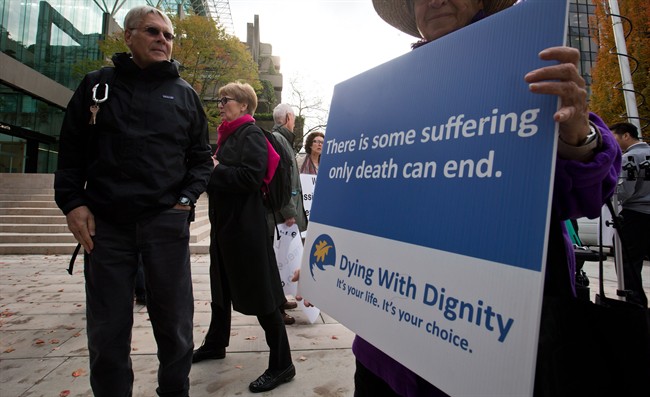Just when you thought Canada’s years-long legal battle over assisted death was finished, the federal government may find itself back in court, being sued again over allegedly unconstitutional laws.

The target in this instance is Bill C-14, the law the Liberals unveiled last week as their response to the Supreme Court of Canada’s landmark 2015 decision in Carter v. Canada, striking down Canada’s prohibition on physician-assisted death.
READ MORE: What if there is no assisted death law?
Health Minister Jane Philpott and Justice Minister Jody Wilson-Raybould characterized the bill as a principled compromise on a tight time frame.
WATCH: Wilson-Raybould outlines assisted death eligibility

But the people who spent years fighting for the right to get a doctor’s help dying are not impressed.
They say this bill doesn’t comply with the Supreme Court’s Carter ruling. And if C-14 passes as-is, they may take the feds to court over it.
“In the end, we taxpayers will have to pay for that to go back to the Supreme Court again. That’s our tax money the government uses when it goes to defend legislation it should know right now cannot pass a challenge.”
Some of the key plaintiffs in the original case, including Kay Carter’s daughter Lee Carter, spoke out against C-14 alongside the B.C. Civil Liberties Association in Ottawa Thursday afternoon.
The Civil Liberties Association is considering legal action if the “reasonably foreseeable” part of the bill isn’t taken out, said executive director Josh Paterson.
“We’ve been fighting this for the last five or six years and thought we had a win, thought we were done. And now we as an organization are going to have to look, as this bill passes, at what we’re going to do. It’s not as easy as walking into court the next day and saying, ‘Well, we’re back,'” Paterson said.
READ MORE: What you need to know about feds’ assisted death law
Taylor argues that Kay Carter, who became the face (and the name) of assisted death in Canada, wouldn’t qualify for assisted death under the Liberals’ proposed bill: She wasn’t about to die from the condition causing her so much pain.
“That stuff about a ‘reasonably foreseeable’ death? Kay Carter herself wouldn’t meet that criteria,” Taylor said.
“It’s going to lose at the Supreme Court if it’s challenged. Why they would put us all through that, I don’t know.”
Liberal MP Rob Oliphant, who chaired the committee that made its own detailed recommendations to Parliament earlier this year, also has concerns the bill wouldn’t survive a Charter challenge.
“I’m not a lawyer; however, in my reading, and on advice I’ve received from a number of lawyers, I think it’s very doubtful the whole bill would be completely Charter-proof,” he said.
“I could imagine a number of instances where people say they feel left out of this bill and it could be challenged.”

But Oliphant would rather not see it come to that.
“You don’t want to put a person who is facing imminent death in any way, or has intolerable suffering, through the requirement of challenging a law in the court,” he said.
“It’s a long process: Both Gloria Taylor and Kay Carter died before that decision came about. And I always weigh towards never making people suffer longer than they have to suffer.”
If people do take the federal government to court over the assisted death law, it’ll be a long legal slog: They’d have to start back at square one in trial court, says University of Waterloo political science professor Emmett Macfarlane.
“The only way to challenge the new law once it passes would be from scratch, at a trial court,” he wrote in an email.
‘My wife went through hell’: husband of Alberta woman granted physician-assisted death





Comments